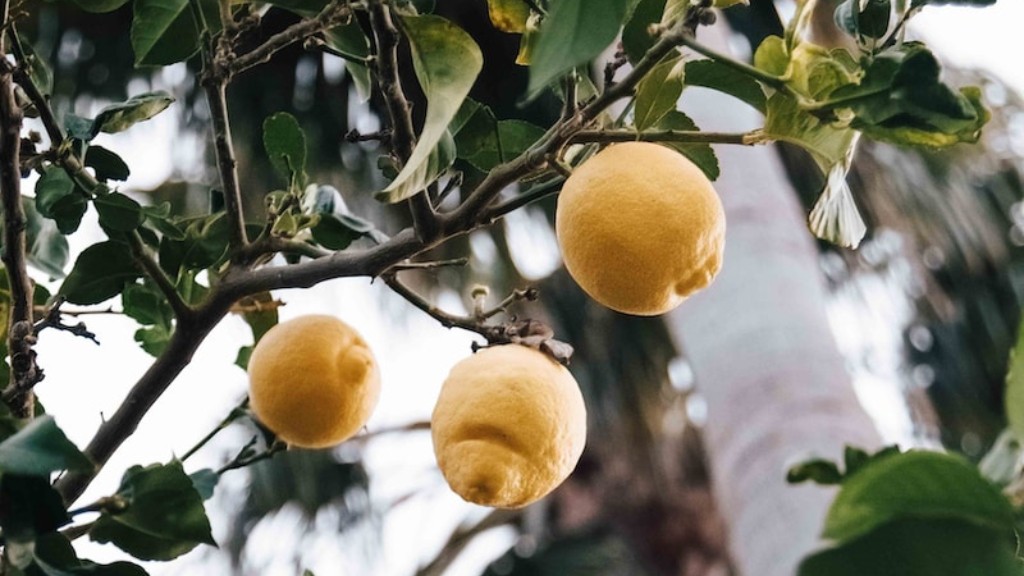Lemon trees (Citrus limon) are sensitive to environmental conditions and require regular maintenance. One of the most common issues for lemon tree owners is curled leaves. This can be caused by a number of factors, including water stress, temperature stress, pests, and diseases. To effectively treat the problem, it is important to pinpoint the underlying cause.
Water stress is one of the most common causes of curled lemon tree leaves. Lemon trees need consistent water and a large amount of moisture on a regular basis. If the soil is dry, it can cause the leaves to curl up in order to preserve moisture and encourage growth. Overwatering can also lead to curled leaves, as the roots will struggle to absorb the excess amount of water.
Temperature can also cause lemon tree leaves to curl up. If the temperature is too high, the leaves may curl to protect the tree from extreme heat. If the temperature is too cold, the leaves will also curl in an effort to raise the temperature around the tree and prevent leaves from freezing.
Pests can also be to blame for curled lemon tree leaves. Common pests include aphids and scale, both of which can cause leaves to curl up in order to prevent irritation.-Mealeybugs, whitefly, and spider mites can also cause curled lemon tree leaves. Finally, diseases such as citrus leaf curl can also cause the leaves to curl up.
In order to treat the problem, it is important to identify the underlying cause. If the soil is overly dry, the tree should be watered more often. If the soil is overly wet, the tree should be watered less frequently. If pests are to blame, then an appropriate insecticidal solution should be applied. If a disease is present, then the affected leaves should be removed and the tree should be treated with a fungicide. Finally, if the temperature is too extreme, then the tree may need to be covered or moved to a more suitable location.
Nutrient Deficiency
Nutrient deficiency is another possible cause of curled lemon tree leaves. Lemon trees require a certain amount of nitrogen, phosphorus, and potassium in order to produce healthy foliage. If the tree is not receiving enough of one or more of these nutrients, then the leaves may curl in order to conserve energy and resources.
The best way to determine if nutrient deficiency is the culprit is to take soil samples and have them analyzed by a laboratory. The laboratory will then be able to recommend an appropriate fertilizer regimen to treat the problem. Alternatively, if the tree is exhibiting signs of yellowing and wilting, then a soil nutrient amendment such as compost or manure can be applied to improve the quality of the soil.
Nutrient deficiency can also be caused by improper pH levels in the soil. Lemon trees prefer soil with a pH range of 6.0-6.5, so if the pH is higher or lower than this range then the tree may not be able to absorb the necessary nutrients from the soil.
Other Causes
Other environmental factors can also cause curled lemon tree leaves, such as low humidity and excessive wind. Low humidity can cause leaves to curl as the tree tries to conserve moisture, whereas excessive wind can cause leaves to curl due to excessive stress. In both cases, the best way to treat the problem is to provide the tree with a suitable environment, such as a greenhouse or sheltered area.
Lemon tree leaves can also curl due to physical damage. If the leaves are handled too roughly or exposed to extreme temperatures, then they may curl as a reaction to the stress. This can also be caused by too much pruning, as the tree may reduce leaf size in an effort to conserve resources.
Finally, lemon tree leaves can also curl due to too much sun. Lemon trees prefer a medium amount of sunlight, so if the tree is exposed to too much direct sunlight then the leaves may curl in order to shield themselves from the bright light.
Conclusion
Curled lemon tree leaves are a common problem for many lemon tree owners. The underlying cause of the problem must be identified before it can be effectively treated. The most common causes are water stress, temperature stress, pests, diseases, nutrient deficiency, low humidity, wind, physical damage, and too much sun. With the proper care and maintenance, lemon tree owners can enjoy beautiful, healthy lemon trees with lush foliage.



